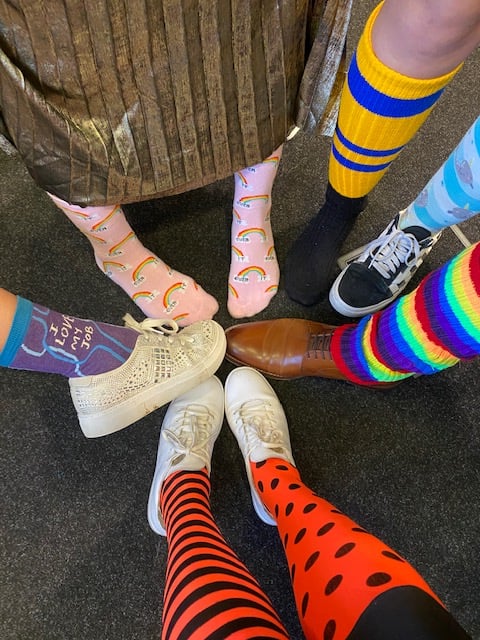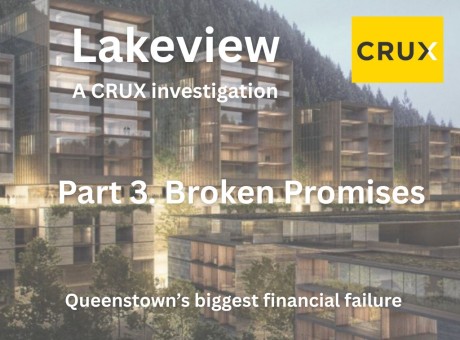Great minds don't think alike

An essay by guest contributor Esther Whitehead in celebration of Neurodiversity Week
Working in the space of seeking out neurodiverse talent for the last 15 years, as well as advocating for the needs of those with (or without) diagnoses, has led me to come to two main conclusions, firstly, that none of us is 'normal' because there's no such thing, and secondly, that we should treat people differently because of their differences...this is the essence of equity rather than equality.
There is nothing more unequal than the equal treatment of unequals…read that again (I'm paraphrasing Aristotle), and yet we insist on cookie-cutter standardised measures and practices across schools, workplaces and throughout New Zealand society.
So what exactly is Neurodiversity? It's an umbrella term which describes neurological differences like dyslexia and ADHD as the result of natural variation in the human genome. It's a term that challenges negative stereotypes about natural neurological differences. The term aims to transform how neurodivergent individuals are perceived and supported by providing schools, universities, and organisations with the opportunity to recognise the many talents and advantages of being neurodivergent, rather than focusing on what individuals can't do. It's about being helpful in creating more inclusive and equitable cultures that celebrate differences and empower every individual.
I'm still asked: why do we need labels, why does everyone seem to have a diagnosis these days? Just last week at dinner, a friend asked me if I thought it was on trend. Well, it's true that when you look at the rate of diagnoses, they have increased hugely in the last couple of decades. To me, this is the learning that's been provided by evidence from neuroscience and particularly fMRI scans. We now know that the brains of those with a diagnosis of say autism spectrum, dyslexia, and Adhd are structured differently and wired differently. In much the same way that we now understand so much more about stroke victims or comatose people and what they're able to comprehend and how to retrain their brain. We now understand that human brains don't think alike - there is no standard brain. When we understand how a person thinks and learns we can enable them to thrive and this has the secondary benefit of improving workplace culture, productivity and innovative thinking. That doesn't mean we're going to scan every brain to tailor every work set-up but it does mean that we start from the premise of holding the knowledge, that we think, learn, and communicate differently and that our workplaces could begin to adapt to better reflect that and include different thinkers.

Remarkables Primary School are rocking their most colourful, mismatched and unique socks for Neurodiversity Celebration week.
Embracing neurodiversity can help provide competitive advantages and many prominent companies in other countries, such as Microsoft, EY, SAP, have reformed their HR policy and processes and proven that the company and staff have benefited from more inclusive policies. In much the same way as a team benefits from gender diversity and cultural diversity etc, a team benefits from thinking from 'the edges' which helps offset tendencies to all look in the same direction. As humans we have increasingly developed mono-cultures, not just in agriculture but in societal structures and business hierarchies. Interestingly and disturbingly, the criteria for recruiting people in western societies often unintentionally screens out neurodiverse people. Generic characteristics which are held in high regard across all sectors tend to be likeability, 'fitting-in', networking skills, leadership skills etc. However these social skills sometimes blinker us from the skills we actually need to prioritise for specific tasks in many organisations today and in the future.
The term neurodiversity is clunky but it's come of age, it's a mainstream issue which is not talked about enough in NZ and the future depends on our collective ability to innovate to help resolve the wicked problems of today such as climate change, biosphere collapse, economic breakdown etc. When different thinkers are excluded from collaborating or participating we all take a step backwards and those in our community who are arguably better placed to innovate are not even around the table. This is known as cognitive exclusion and it's very apparent when we review employment statistics for the neurodiverse. It has been estimated that up to 80 percent of our potential neurodiverse workforce are either unemployed or underemployed (see here).
Aren't we just becoming obsessed with being Politically Correct? No, I don't believe so. When we enable diverse thinkers we see that the 'square pegs' are the entrepreneurs, the creatives, the engineers, the inventors - they exist in our 'good' statistics. For example, 35 percent of entrepreneurs are dyslexic (much higher than the incidence of dyslexia in the general population). (Logan, J, 2019)
Neurodiversity doesn't hold people back, it's our stereotypes that do! When we disable diverse thinkers, we see these people show up in the 'dark' statistics such as unemployment, incarceration and mental health. This is because we have so many systemic barriers that hold neurodiverse people back
Systemic barriers are structural barriers in policy that hold people back and limit their ability to access information or participate in society. Some of the barriers are in:
- Education – Many adults have been through a school system that did not recognise, acknowledge, understand, or support their learning needs, and they may have negative views of their abilities. Further education or training that relies on accommodations, interventions, and supports are not universally available.
- Employment – Many employers also don’t understand or recognise neurodiversity and may not provide accommodations for potential or current employees.
- Healthcare and justice – Information and services are often not accessible – crucial information is often provided or requested in a written format or can't be accessed easily by the neurodiverse.
- Financial – There are often additional costs to have assessments, diagnoses, and extra support, such as private tutors and assistive technology.
So what are our opportunities? I believe that our opportunities are massive, as the neurodiverse make up a huge minority across all socioeconomic, ethnic, age, and gender groups. The first thing we can do is start having conversations, by committing to learning more, so take a look at Neurodiversity Celebration Week this week March 21 to 27. If you have questions, email me [email protected], or go to the links below to see what's happening in New Zealand. In Queenstown Lakes, we will also be hosting a 'Meaningful Conversation on Thriving with Neurodiversity' through the QLDC Library Service - dates to be confirmed so keep an eye out.
When we accept and empower diverse thinkers rather than trying to 'fix' or 'mould' them, we improve 'belonging', school engagement, educational outcomes, mental health and wellbeing; we decrease loneliness, anxiety, and societal costs in the 'dark' statistics. We can no longer blame ignorance for the exclusion of certain individuals from participation, it's now we need to inform ourselves and our colleagues on neurodiversity to stymie the widespread (unintentional) bias that exists in New Zealand. It's high time the government of the day steps forward and addresses legislation and policy to support inclusion and accessibility.
There are a growing number of local and national bodies, interest groups, individuals and organisations that advocate, advise and facilitate positive change:
https://thrivable.design/ A consultancy facilitating organisations to think differently about how we can all thrive, focusing on policy and whole-staff professional development in neurodiversity and inclusion through e-learning courses. Mentoring for entrepreneurs and start-ups.
https://www.uniqueminds.co.nz/ A coaching service for neurodiverse individuals.
https://pivotalpoint.org.nz/ A new charity in Queenstown Lakes empowering whānau to access the help required to holistically support all our neurodiverse tamariki.
https://sharpe-minds.com/services Teacher and parent workshops.
https://divergenthinking.co.nz A consultancy providing resources and training to workplaces.
https://theeducationhub.org.nz/ A website with educational resources for schools and learning institutions.
There are also numerous organisations and individuals that work in the area of specific learning differences (too many to list).
Helpful Glossary
Learning Disability: A range of learning difficulties experienced by people who are NOT limited in either intellectual functioning (e.g. reasoning, problem solving) or in adaptive behaviour. A learning disability does not refer to intelligence or intellect. In New Zealand, the terms 'learning disability' and 'learning difference/difficulty' are sometimes used interchangeably. However, in the United Kingdom, 'learning disabilities' are called 'learning difficulties', and 'intellectual disabilities' are called 'learning disabilities' - That's confusing!
Neurodisability: A focus on the disabling barriers within society that discriminate against neurodiverse people in social contexts (Macdonald, 2009). A person is 'disabled' when an environment does not accommodate their needs.
Neurodiversity: Essential neurological difference associated with individual or community identity. As a social model concept neurological differences are viewed as a natural human variation rather than a pathology. This view radically shifts the focus of advocacy towards concepts such as human diversity and identity (Lollini, 2018). Neurodiversity encompasses all specific learning differences (SLD), many of which co-occur or overlap.
Specific Learning Difference: A difference, difficulty, or preference for a certain way of learning, most often accompanied by a unique set of strengths. Common SLDs are often associated with difficulties processing information, particularly code/text/print:
- Dyslexia – A different way of processing information with symptoms associated with text/literacy and language-related skills, it may also include visual stress.
- Dyspraxia – Related to fine and/or gross motor skills, may also involve organisation skills, visual perception, language, or speech.
- Dyscalculia – Affecting ability to understand, manipulate, and calculate using mathematical code.
- Dysgraphia – Affecting both the ability to handwrite (fine motor skills) and the processing of encoding verbal language into written code.
- Attention deficit (hyperactivity) disorder (ADD/ADHD), with or without hyperactivity – Attention is often global.
Esther Whitehead is an advisor to the Ministry of Education and Ministry of Justice, through her consultancy Thrivable.design. She was managing trustee of the Dyslexia Foundation for 12 years, advocating for the needs of neurodiverse individuals and for the reform of New Zealand educational and judicial policy and practices. Ms Whitehead has won cases against the Ministry of Justice through the Human Rights Commission for 'unintentional' discrimination against individuals that come before the court system. Ms Whitehead works with individuals, schools and organisations to help build more inclusive practices. You can email her at [email protected]
References:
Logan, J (2019) Entrepreneurship at London’s Cass Business School.https://www.amanet.org/articles/new-research-reveals-many-entrepreneurs-are-dyslexic/
Lollini, A. (2018). Brain Equality: Legal Implications of Neurodiversity in a Comparative Perspective. New York University Journal of International Law and Politics, 51, 69.
Macdonald, S. J. (2009). Windows of reflection from adults with dyslexia: Conceptualising dyslexia using the social model of disability. Dyslexia: An International Journal of Research and Practice, 15, 347–362.


























